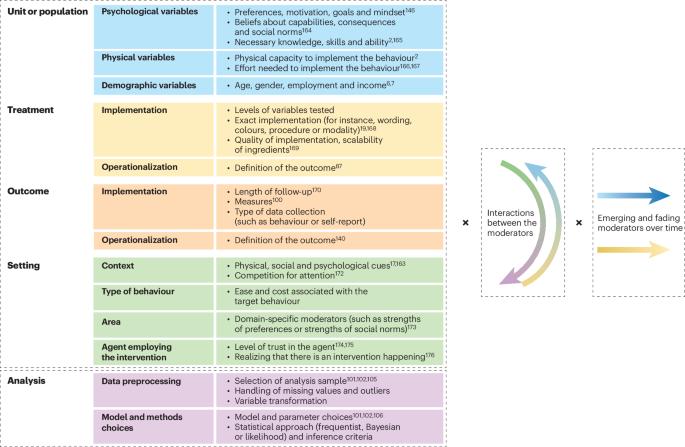Generalizability of choice architecture interventions
IF 21.8
Q1 PSYCHOLOGY, MULTIDISCIPLINARY
引用次数: 0
Abstract
Although a given choice architecture intervention (a ‘nudge’) can be highly effective in some conditions, it can be ineffective or counterproductive in others. Critically, researchers and practitioners cannot reliably predict which of these outcomes will happen on the basis of current knowledge. In this Review, we present evidence that the average effectiveness of choice architecture interventions on behaviour is smaller than often reported and that there is substantial heterogeneity in their effects. We outline the obstacles to understanding the generalizability of these effects, such as the complex interaction of moderators and their changes over time. We then clarify dimensions of generalizability and research practices (including systematic exploration of the moderators and practices designed to enhance generalizability) that could enable evidence on generalizability to be gathered more efficiently. These practices are essential for advancing nuanced theories of behaviour change and for more accurately predicting the effectiveness of choice architecture interventions across diverse populations, settings, treatments, outputs and analytical approaches. Choice architecture interventions (or ‘nudges’) aim to guide behaviour by changing the proximal physical, social or psychological environment. In this Review, Szaszi and colleagues show that the average effectiveness of these interventions is small and variable and outline how researchers can gather evidence defining this generalizability more efficiently.

选择架构干预的概括性
尽管给定的选择架构干预(“推动”)在某些情况下可能非常有效,但在其他情况下可能无效或适得其反。关键是,研究人员和从业人员无法根据现有知识可靠地预测这些结果中的哪一种会发生。在这篇综述中,我们提供的证据表明,选择架构干预对行为的平均有效性比通常报道的要小,而且它们的效果存在很大的异质性。我们概述了理解这些影响的普遍性的障碍,例如调节因子的复杂相互作用及其随时间的变化。然后,我们阐明了概括性的维度和研究实践(包括系统地探索调节因子和旨在增强概括性的实践),这可以使关于概括性的证据更有效地收集。这些实践对于推进细致入微的行为改变理论,以及更准确地预测跨不同人群、环境、治疗、产出和分析方法的选择架构干预的有效性至关重要。选择建筑干预(或“推动”)旨在通过改变近端物理、社会或心理环境来指导行为。在这篇综述中,Szaszi及其同事表明,这些干预措施的平均有效性是小而可变的,并概述了研究人员如何更有效地收集证据来定义这种普遍性。
本文章由计算机程序翻译,如有差异,请以英文原文为准。
求助全文
约1分钟内获得全文
求助全文

 求助内容:
求助内容: 应助结果提醒方式:
应助结果提醒方式:


